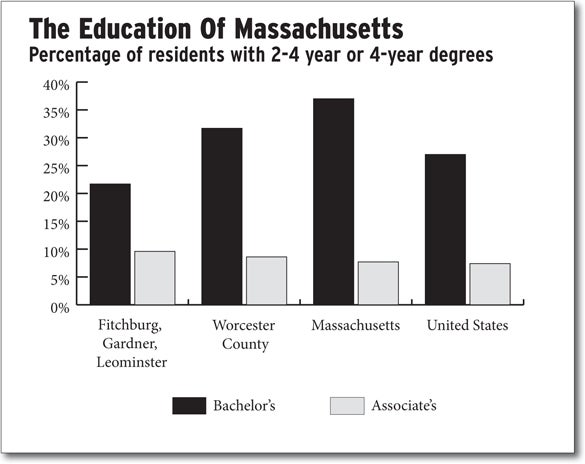In a recent report on economic development in North Central Massachusetts, a group of graduate student researchers from MIT presented a striking statistic.
In the area made up of Fitchburg, Gardner and Leominster and the surrounding towns, 2006 U.S. Census data shows that only 21.7 percent of residents age 25 and older have a bachelor’s degree.
Lagging Indicator
That’s less than in the state as a whole (37 percent), Worcester County (31.7 percent) and even the nation (27 percent). But it remains an open question what the relative lack of college education means for the area’s economy.
Karl Seidman, the MIT professor whose students did the study, said there are a number of possible explanations for the dearth of bachelor’s degrees.
As a historical manufacturing center that still retains a relatively high number of factory jobs, Seidman said, the area may once have offered – and may still to some extent offer – decent paying jobs that don’t require a four-year degree. The relatively high percentage of older residents found in the area could also contribute to the high numbers of people without bachelor’s. And another factor could be out-migration of more educated young people searching for opportunities elsewhere, he said.
Whatever the reasons, David McKeehan, president of the North Central Massachusetts Chamber of Commerce, said local employers aren’t particularly concerned.
âI don’t hear complaints from employers about whether someone has a four-year degree or not,â he said. âI hear complaints from employers on a regular basis that they find it difficult to match skills to their job needs.â
But, he added, that’s true not just in the North County but all across the state.
Training Gap
As part of the MIT study, the students surveyed local employers in the manufacturing sector, an industry that many locals look to with hope as companies like Bristol-Myers Squibb and Evergreen Solar set up shop in nearby Devens. Despite the high-tech nature of much modern manufacturing, the study found the skills that employers are most concerned about finding are things like basic science and interpersonal communication abilities. They also found that manufacturing employers see stability, work ethic and flexibility as big pluses in potential employees.
âFor lower-level positions, many employers prefer no additional education beyond high school,â the report said.
Even for more skilled positions, employers often aren’t looking for four-year degrees, said Nancy Jackson, the director of the North Central Massachusetts Economic Development Council, which worked with the MIT group on the study.
She said there are many good-paying jobs in the area in fields like biotechnology and health care that suit workers with just two-year degrees.
And, according to the census data, 9.6 percent of workers in the Fitchburg, Leominster and Gardner area have associate’s degrees, compared with 7.4 percent in the U.S. and 7.7 percent in Massachusetts.
âI think that’s relevant,â Jackson said. âFirst of all I think it points to Mount Wachusett (Community College) really serving the varied needs of the population here.â
Jackson also noted that the Fitchburg, Gardner and Leominster area is just a small section of the larger North Central Massachusetts region that her organization represents. People who live in the region’s eastern section generally have higher incomes and more education, she said.
Neither the study nor the local experts deny that there are problems in area residents’ preparedness for work. But both employers interviewed by the MIT students and those McKeehan works with say that what’s most needed is training for specific jobs.
In fact, the main recommendation that came out of the study was more coordination of job training programs to make it easier for employees to climb career ladders.
Seidman said the best course for the region may be to improve training for workers going into semi-skilled jobs while also encouraging more high school students to continue on to college.
âIt’s certainly a good idea, especially looking to the future, trying to expand the college educated workforce in the region,â he said. âI’d say follow both approaches.â
McKeehan said that’s probably a good idea. Even in the manufacturing field, he said, there’s reason to believe that college education is slowly becoming more important.
âIs more education going to be required as we go forth?â he said. âProbably. I think I was recently told that nationally the average education on the shop floor in a manufacturing facility was 14 years. Will it be 15 years in a number of years? That’s possible.â

